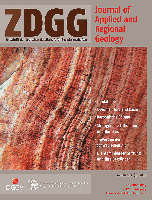
Zeitschrift der Deutschen Gesellschaft fur Geowissenschaften
metrics 2024
Elevating Research: Your Source for Cutting-edge Geoscience Studies
Introduction
Zeitschrift der Deutschen Gesellschaft für Geowissenschaften is a prominent academic journal published by E Schweizerbart’sche Verlagsbuchhandlung, dedicated to advancing research in the field of Earth and Planetary Sciences. With its ISSN 1860-1804 and E-ISSN 1861-4094, this journal provides a platform for researchers to disseminate high-quality scientific articles and insights that contribute to our understanding of geological and environmental phenomena. Over the years, it has established itself as a reputable source within its category, holding a Q3 ranking among the Earth and Planetary Sciences (miscellaneous) journals in 2023, and achieving an impressive 85/195 rank in Scopus, placing it in the 56th percentile. The journal is published from Germany, specifically at Johannesstraße 3A, D 70176 Stuttgart, where it fosters a collaborative environment for scholars, professionals, and students alike. Although currently not an Open Access journal, it offers critical insights into various geoscience topics, making it an essential resource for those engaged in geological research and education. With its converged years stretching from 2008 to 2024, Zeitschrift der Deutschen Gesellschaft für Geowissenschaften is poised to continue its impactful role in the geosciences community.
Metrics 2024
 0.35
0.35 1.50
1.50 1.20
1.20 24
24Metrics History
Rank 2024
Scopus
IF (Web Of Science)
JCI (Web Of Science)
Quartile History
Similar Journals

DOKLADY EARTH SCIENCES
Exploring the Frontiers of Geoscience ResearchDOKLADY EARTH SCIENCES is a reputable journal published by MAIK NAUKA/INTERPERIODICA/SPRINGER, focusing on the dynamic field of Earth and Planetary Sciences. With an ISSN of 1028-334X and E-ISSN 1531-8354, this journal offers a platform for researchers to disseminate their findings and insights that contribute to our understanding of Earth systems over a continuous publishing span from 1998 to 2024. It currently holds a Q3 quartile ranking in the Earth and Planetary Sciences category, reflecting an emerging yet significant impact within its field, evidenced by its Scopus ranks where it stands at 123rd in general Earth sciences and 113th in miscellaneous Earth sciences. DOKLADY EARTH SCIENCES aims to bridge research gaps and foster collaboration among a diverse audience including researchers, professionals, and students committed to advancing knowledge in geoscience. The journal stands as a vital resource for those seeking to explore contemporary challenges and innovations within the realm of Earth sciences.
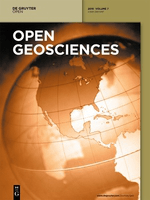
Open Geosciences
Innovating Discussions in Environmental Science.Open Geosciences, published by DE GRUYTER POLAND SP Z O O, is a prominent open access journal that has been serving the scientific community since its inception in 2015. With an ISSN of 2391-5447, this journal focuses on the dynamic fields of Earth and Planetary Sciences as well as Environmental Science, securing a commendable Q2 ranking in both categories as of 2023. Situated in Germany, Open Geosciences is committed to disseminating high-quality research and facilitating innovative discussions surrounding geosciences. The journal embraces a diverse range of topics, aiming to foster collaboration among researchers, professionals, and students worldwide. As an open access publication, it enhances visibility and accessibility of its articles, allowing for greater engagement within the global scientific community. This is further substantiated by its respectable Scopus rankings—77th out of 195 in General Earth and Planetary Sciences and 97th out of 219 in Environmental Science—which underscore its significance in advancing geoscientific knowledge. Whether you are a researcher looking to publish your findings or a student seeking valuable insights, Open Geosciences stands out as a crucial resource in the exploration of our planet and its environment.
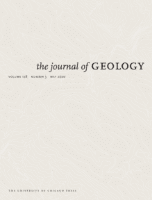
JOURNAL OF GEOLOGY
Unveiling Geological Insights for a Sustainable Future.The JOURNAL OF GEOLOGY, published by University of Chicago Press, serves as a premier platform for disseminating groundbreaking research in the field of geology. Established in 1973, this esteemed journal has consistently ranked in the Q2 category in geology, further solidified by its Scopus ranking, where it is positioned at 99 out of 321 in Earth and Planetary Sciences, marking it in the 69th percentile of its category. With an emphasis on innovative and interdisciplinary studies, the journal features peer-reviewed articles that contribute to the understanding of geological processes, earth materials, and environmental interactions. Although it does not currently offer open access, it facilitates broad access through academic institutions to reach a global audience of researchers, professionals, and students striving to advance the knowledge of Earth's history and dynamics. As a vital resource for the geology community, the JOURNAL OF GEOLOGY plays an essential role in fostering scholarly dialogue and advancing both academic inquiry and practical applications in geology.

GEOLOGICAL QUARTERLY
Exploring Earth's Mysteries, One Quarter at a Time.GEOLOGICAL QUARTERLY, published by the Polish Geological Institute, is a respected journal in the field of geology, offering insights into Earth and planetary sciences since its inception in 2000. With an ISSN of 1641-7291 and an E-ISSN of 2082-5099, this journal serves as a vital platform for researchers, professionals, and students seeking to expand their knowledge in geological disciplines. The journal is positioned in Q3 within the geology category as of 2023 and ranks #172 out of 321 in Scopus, placing it in the 46th percentile among its peers. Although currently not an open-access publication, GEOLOGICAL QUARTERLY reflects the policy of fostering scientific communication and collaboration by disseminating valuable geological research. Its commitment to publishing original articles, reviews, and technical notes ensures that it plays a significant role in advancing geological science and its applications within the academic community. With its base in Warsaw, Poland, the journal stands as an important resource for anyone engaged in or studying the Earth sciences.
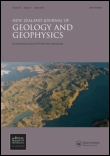
NEW ZEALAND JOURNAL OF GEOLOGY AND GEOPHYSICS
Advancing Knowledge in Geology and Geophysics.NEW ZEALAND JOURNAL OF GEOLOGY AND GEOPHYSICS, published by Taylor & Francis Ltd, stands as a prominent forum dedicated to the interdisciplinary exploration of geological and geophysical phenomena. With an impact factor that situates this journal in the prestigious Q1 category across key subjects—namely Earth and Planetary Sciences, Geology, and Geophysics—it is a critical resource for researchers, professionals, and students alike. The journal has been operational since 1958 and continues to contribute valuable insights into the complexities of the Earth's processes. Although it does not currently offer Open Access options, its broad readership benefits from an extensive archive of high-quality research findings that span from 1958 to 2024. Located in the United Kingdom, the journal remains a pivotal player in advancing the understanding of Earth's systems, making significant contributions to both academic inquiry and practical applications in the field.

BULLETIN OF GEOSCIENCES
Advancing Earth Sciences through Innovative ResearchBULLETIN OF GEOSCIENCES, published by the prestigious Czech Geological Survey, stands as a pivotal resource in the fields of Earth and Planetary Sciences and Environmental Science. Since its inception in 2003, the journal has been committed to advancing knowledge through high-quality research, currently holding a commendable Q2 ranking in both disciplines. With its focus on diverse and innovative topics, BULLETIN OF GEOSCIENCES provides an essential platform for researchers, professionals, and students aiming to disseminate and access impactful studies. The journal is indexed in Scopus, ranking #78/195 in General Earth and Planetary Sciences and #110/233 in General Environmental Science, reflecting its significant contribution to academia. Publishing from Prague, Czech Republic, this journal invites contributions that illuminate the interactions between geological processes and environmental phenomena, ensuring an inclusive and accessible approach to crucial global issues.
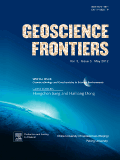
Geoscience Frontiers
Leading the Charge in Earth Science DiscoveriesGeoscience Frontiers is a premier open-access journal that has been at the forefront of disseminating impactful research in the field of Earth and Planetary Sciences since its inception in 2010. Published by China University of Geosciences, Beijing, this journal operates from the Netherlands and has gained recognition for its rigorous peer-review process and high standards of scholarship, earning a distinguished position as Q1 in the Earth and Planetary Sciences category. With a Scopus ranking of 5 out of 195, placing it in the 97th percentile, it reflects the journal's commitment to addressing global geological challenges and advancing our understanding of the Earth’s dynamic systems. As an open-access platform, Geoscience Frontiers ensures that vital research is widely accessible, fostering collaboration and innovation among researchers, professionals, and students alike. By providing a forum for cutting-edge discoveries and theories, the journal plays a critical role in shaping the future of geoscientific research and education.

Journal of Earth Science
Pioneering discoveries in geology and environmental science.Journal of Earth Science, published by the China University of Geosciences, Wuhan, is a leading journal in the field of Earth and Planetary Sciences, recognized for its significant contributions to the understanding of geological processes and environmental challenges. With an impressive Q1 ranking among Earth and Planetary Sciences journals and a strong position at Rank #39/195 in Scopus, this journal not only showcases high-quality research but also serves as a crucial platform for disseminating innovative findings, spanning a broad spectrum of topics from geophysics to climate change. The journal adopts an open access model, which enhances the visibility and accessibility of research articles published from 2009 to 2024, thereby facilitating collaboration and knowledge sharing among the global scientific community. With its commitment to advancing geosciences, Journal of Earth Science is invaluable for researchers, professionals, and students alike, eager to stay informed and contribute to ongoing discussions in this dynamic field.
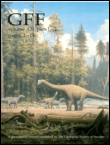
GFF
Unearthing Insights, Shaping the Future of Earth Sciences.GFF is a prestigious academic journal dedicated to advancing research in the fields of Geology and Paleontology. Published by Taylor & Francis Ltd in the United Kingdom, GFF serves as a vital platform for disseminating innovative findings and fostering discussions among researchers, professionals, and students alike. With a noteworthy impact factor reflecting its significance in the scientific community, GFF has achieved Q2 ranking in both Geology and Paleontology, underscoring its commitment to high-quality scholarship. The journal has been operational since 1872, accumulating a rich history of contributing to our understanding of earth sciences. It currently ranks #133 out of 321 in Earth and Planetary Sciences - Geology, and #50 out of 113 in Paleontology according to Scopus rankings. Although it does not offer an open access option, GFF remains accessible through various academic databases, ensuring that cutting-edge research reaches a wide audience. Its comprehensive scope aims to explore critical advancements in geological and paleontological sciences, making it an essential resource for those committed to exploring the intricacies of our planet’s past and present.

Journal of Himalayan Earth Sciences
Fostering Collaboration in Himalayan Earth ResearchThe Journal of Himalayan Earth Sciences (ISSN: 1994-3237; E-ISSN: 2305-6959) is a distinguished publication by UNIV PESHAWAR, dedicated to advancing knowledge in the field of earth sciences, particularly as they relate to the Himalayan region. Established in 2013, this journal aims to provide a platform for researchers, professionals, and students to share original research findings, reviews, and innovative methodologies that contribute to the understanding of geological and environmental phenomena in this ecologically significant area. Despite being categorized in Q4 of the Earth and Planetary Sciences, the journal showcases valuable contributions to the scientific community and encourages submissions that delve into both the challenges and advancements within Earth sciences, with a particular focus on the unique geological structures and processes of the Himalayas. As an open-access journal, it ensures that research is accessible to a global readership, promoting collaboration and discussion among scholars and practitioners. The journal's operational base in Peshawar, Pakistan, places it at the heart of Himalayan research, making it an invaluable resource for those invested in earth sciences.